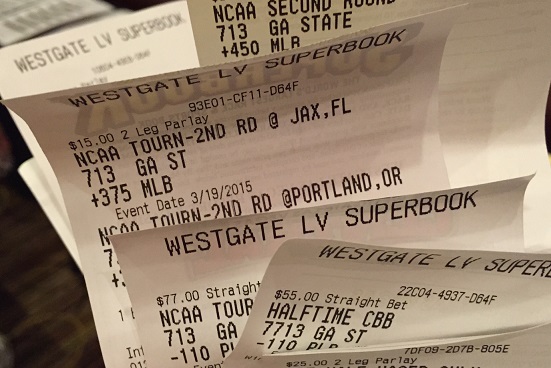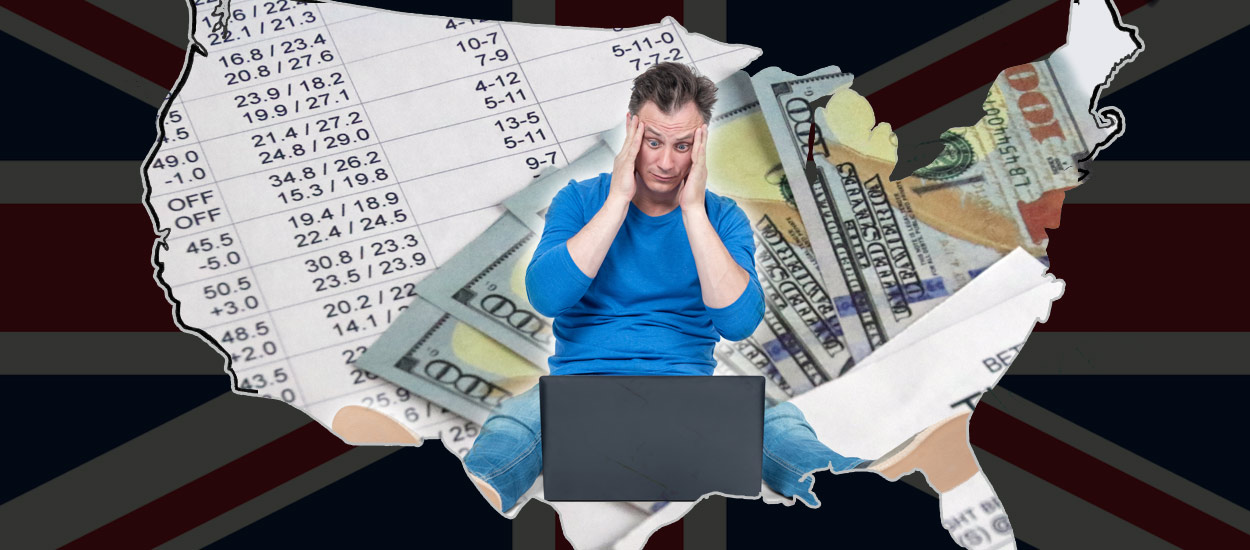As online betting explodes in the America, the U.S. should look at the trajectory of gambling in the UK
The UK has had legalized gambling since 1960. The Gambling Act permitted bookmakers to accept on-track horse racing bets and not long after, large bookmakers started setting up physical shops where they took bets on sports, as well as horse racing, with soccer being the most popular offering. The UK's arguments for legalizing sports betting was to shut out illegal bookmakers who were rampant in the UK, while providing tax revenue to the government. Eventually bookmakers started taking telephone bets from UK citizens, but in the early 1990s they also started accepting wagers from around the world, since the laws in the United Kingdom allowed it, provided the bookmaker paid the tax. Companies like Bowman International became popular throughout North America with phone in wagering along with the myriad of Caribbean-based sportsbooks who accepted wagers by phone as well. Around the year 1997 online sports betting started to become popular with most companies locating themselves in the countries of Antigua, Kahnawake (a native reserve in Canada), Costa Rica, Malta, the Isle of Man and Gibraltar. Those countries were chosen since they offered a tax haven for gambling companies to operate without having to collect tax for the government. In exchange the companies paid an annual licensing fee. Bet365, which began operating in the year 2000, was one of few companies to keep their offices in the UK and either collected taxes for the government or else paid the tax on losing bets themselves. Those companies had hoped that their cooperation would win favor with the British government moving forward and they believed the Internet communication was better in the UK than offshore jurisdictions.
Problem gambling explodes in the UK
According to records and sources, the UK never had a major issue with problem gambling prior to 2000, since the vast majority of wagering has always been on sports, which is less addictive than casinos, plus with people required to wager in person, bookmakers could assess those who seemed to be at risk and refuse to book their bets. That changed, however, when internet wagering came along. More than half of sports bets in the UK are now made on the Internet and studies by the National Health Service, along with various groups studying gambling in the UK, indicate that online wagering has a much higher chance of causing problem gambling or at least putting gamblers at risk. There are several factors that create that risk including the ease of placing bets by mobile or computer without having to physically go to a betting shop or casino to make wagers; the integration by most online bookmakers to include casino and poker into their platform; the ability to use various payment methods to gamble including credit cards; and the introduction of in-game betting, which is far more attractive to gamblers as they can wager while the game is on and many often try to chase their losses. Also noted in the reports and of particular concern was the growing number of teens who have become addicted to online gambling, including sports betting. It’s uncertain how these teens avoided the age verification software or got access to a credit card or e-wallet to wager, although many in the industry say that most teens today are technologically advanced and can often bypass the protections put in place.
More than half of sports bets in the UK are now made on the Internet and studies by the National Health Service, along with various groups studying gambling in the UK, indicate that online wagering has a much higher chance of causing problem gambling or at least putting gamblers at risk. There are several factors that create that risk including the ease of placing bets by mobile or computer without having to physically go to a betting shop or casino to make wagers; the integration by most online bookmakers to include casino and poker into their platform; the ability to use various payment methods to gamble including credit cards; and the introduction of in-game betting, which is far more attractive to gamblers as they can wager while the game is on and many often try to chase their losses. Also noted in the reports and of particular concern was the growing number of teens who have become addicted to online gambling, including sports betting. It’s uncertain how these teens avoided the age verification software or got access to a credit card or e-wallet to wager, although many in the industry say that most teens today are technologically advanced and can often bypass the protections put in place.
According to the most recent studies, about 24 million UK adults gamble and 2.7 million of those are considered to have a problem and about 17% of teens and children under 16 are at risk. I was also told by UK residents that around 2002, when online betting became prevalent, they were being bombarded with advertising for gambling and that every other commercial during a game was for one of the online sportsbooks telling them how they could make money on the game and not just be forced to watch it without a vested interest. And every team seemed to be sponsored by some sports betting company whether it was Bet365, Ladbrokes, Bwin or the dozens of other businesses anxious to take their bets.
As a result of the increases in problem gambling, the UK Gaming Commission issued new directives in the last few years, including a limitation on jersey advertising for gambling companies, a ban on any TV or radio advertising during live games that take place before 9 p.m. to ensure that children and teens, along with those at work, will not be able to be tempted to bet on games that are taking place, and a ban on various payment methods including credit cards. Many banks also started banning payments for gambling. Moreover, limits for casino games have been lowered and features like turbo play for casinos and poker have been removed.
With that in mind, anyone who watched the PGA Tour golf tournament in the UK must have felt a sense of déjà vu when the broadcasters kept discussing the odds of the players in the tournament along with proposition odds like player scores on the next hole at BetMGM sportsbook. Granted the tournament was in Las Vegas and was being played at an MGM golf course, but until very recently the discussion of any odds on a sports telecast was seen as taboo. In fact, when Al Michaels or some other commentators would note that a garbage time touchdown was "significant to many people", it raised eyebrows because any bettors realized the comment referred to a team covering a point spread or going over the total. But nowadays there is constant discussion of gambling odds on many American sports telecasts and it is just accepted as the new norm. Moreover, far more athletes now wear advertising for both sportsbooks and fantasy sports sites and are featured in ads for companies like DraftKings and FanDuel, which offer both products in multiple states. Advertising for the sportsbooks is also a regular occurrence and unlike the UK, the advertising takes place at all hours. I spoke to a Pennsylvania resident who said he can’t turn on the TV anymore without seeing an advertisement for FanDuel or DraftKings and even in states where one must place sports bets in person, the advertisements are relentless for companies like DraftKings or William Hill.
Non-stop gambling chatter
I spoke to a media person who writes about problem gambling for a newspaper in the UK and he said that it was inevitable the U.S. would go down the same path as the United Kingdom, given the new opportunities for gambling and consequential government and league revenues from the gambling. But he also warned that it will likely lead to the same fate as what happened in the UK if the U.S. isn't careful.
"I was in the betting business for almost two decades and saw how quickly betting turned from a fun, recreational activity for most to a compulsion when the Internet was used to place bets. When a friend lost his home and his life’s savings because of Internet gambling I realized that I needed to get out of the business and instead start warning others about the dangers. I’m also very concerned about the number of children and pre-adults who are turning to gambling and I can point it right at the hand of the leagues and governments here (the UK) who only saw money and not the dangers of their relentless advertising and targeting of vulnerable people. The rules recently put in place by the Gambling Commission help, but human nature as it is, where people want to gamble, they will find a way around the rules. The best way to truly address the issue without banning it altogether is to stop talking about it non-stop. And from what I witnessed here and what I am hearing and seeing there, the United States is heading down the exact same path as here. All we can do is warn other countries about the dangers of too much promotion and advertising on gambling, but I know it will fall on deaf ears. My suggestion to anyone in the US is to ban advertising during games, disallow credit betting and devote time during telecasts to talk about problem gambling and solution for those with a problem so they know there is a way out. If not, within 5 years you will be hearing more about problem gambling than revenue, and like here, the governments at that time will wonder where their state and federal governments went wrong." Thus far, as mentioned in my last article, 18 states have a form of legalized sports betting and the number is expected to almost double in the next two years. Online casino gambling is still only legislated in five states, but that number is also expected to grow and there is reason to be concerned that in the effort to increase revenues and offer a product that states and gamblers have been demanding for years they could create other issues they aren’t prepared for. It wouldn’t be the first time either. When lotteries were first introduced they were promoted heartily and nowadays one can’t drive by a billboard, to a convenience store or watch TV without hearing or seeing endless advertisements for Powerball, Mega Millions or other lotteries promising the opportunity to change your life around with a ticket, even if that chance is slim to none. But various groups have shown that the number of people playing the lottery has exploded, especially among the groups who could least afford to lose the money.
Thus far, as mentioned in my last article, 18 states have a form of legalized sports betting and the number is expected to almost double in the next two years. Online casino gambling is still only legislated in five states, but that number is also expected to grow and there is reason to be concerned that in the effort to increase revenues and offer a product that states and gamblers have been demanding for years they could create other issues they aren’t prepared for. It wouldn’t be the first time either. When lotteries were first introduced they were promoted heartily and nowadays one can’t drive by a billboard, to a convenience store or watch TV without hearing or seeing endless advertisements for Powerball, Mega Millions or other lotteries promising the opportunity to change your life around with a ticket, even if that chance is slim to none. But various groups have shown that the number of people playing the lottery has exploded, especially among the groups who could least afford to lose the money.
So, it was somewhat exciting to watch a sporting event and seeing gambling odds promoted constantly. It's also refreshing to see that the U.S. has come out of the dark ages and now realizes that legal sports betting has huge benefits for leagues, governments and players and that with any luck, underground bookmakers run by mobsters will become a thing of the past with legalized betting. But it also can’t be overlooked that with the Internet and with the increased ability to watch and wager on games as they are being played there is a good chance of causing addiction. The UK and Australia have seen this, and the U.S. should heed the warnings from those governments.
With caution and a tempered approach, sports betting can be a fun, recreational activity for the majority of citizens. But if states go in full force with guns blazing and horns blaring constantly urging people to wager on games at every opportunity, there is a chance they will create a monster they aren’t prepared for.
Read insights from Hartley Henderson every week here at OSGA and check out Hartley's RUMOR MILL!







































